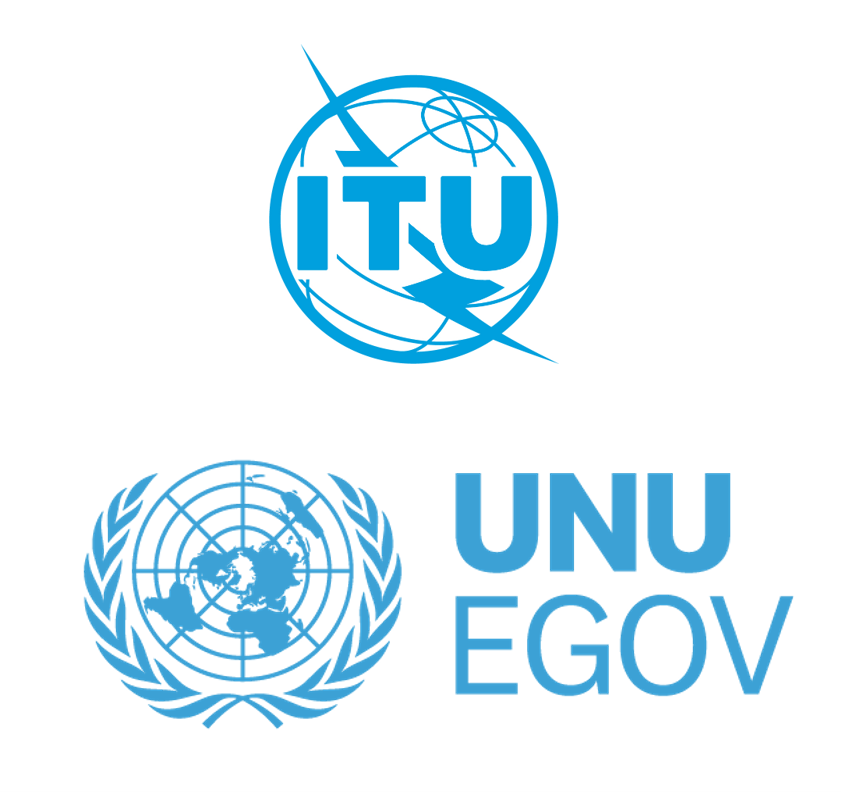Forum on Connected by Design: Building Inclusive Digital Infrastructure for Future-Ready Cities
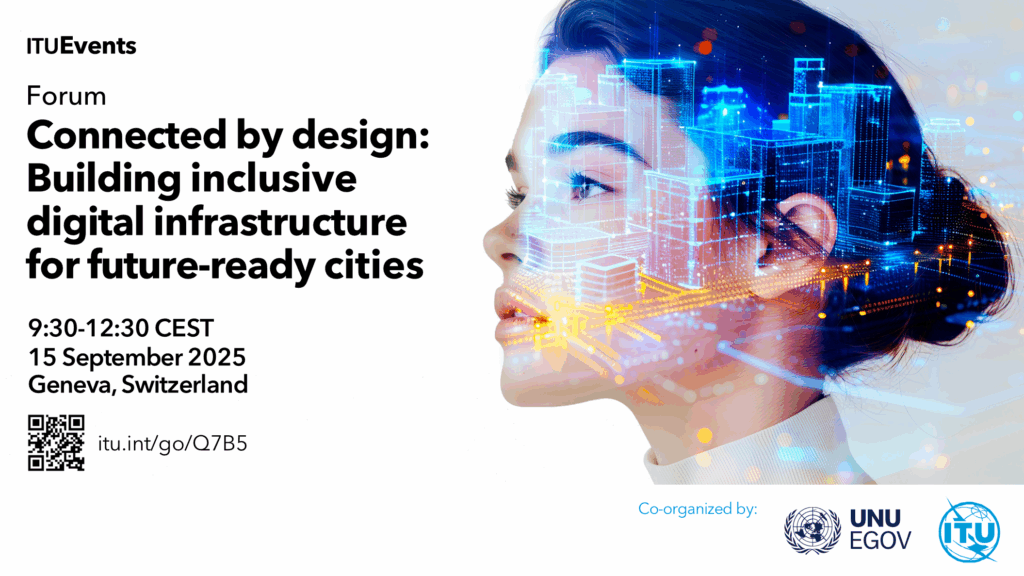
Introduction
The Forum on Connected by Design: Building Inclusive Digital Infrastructure for Future-Ready Cities will bring together global leaders, city innovators, and digital visionaries for a high-level forum exploring how Digital Public Infrastructure (DPI) can transform cities and communities into more inclusive, resilient, and citizen-centric spaces. The Forum will take place on 15 September 2025 in Geneva, Switzerland.
This event will spotlight scalable approaches to interoperable digital ID, payments, data sharing, and smart urban governance, bridging policy, technology, and social impact.
The Forum will be held in English.
Participation
Participation is open to policymakers, business leaders and industry experts, representatives, other UN agencies, academia, civil society, other regional organizations, NGOs, private sector, and other relevant stakeholders. Participation is free of charge and open to all interested stakeholders including ITU Member States, Sector Members, Associates and Academic Institutions and to any individual from a country that is a member of ITU and who wishes to contribute to the work.
The Forum will be collocated with the meeting of ITU-T Study Group 20 (Internet of Things, digital twins and smart sustainable cities and communities) taking place on 15 to 25 September 2025 and meeting of the Joint Coordination Activity on Internet of Things, digital twins and smart sustainable cities and communities (JCA-IoT, DT and SSC&C), taking place on 26 September 2025.
Programme
08:30 – 09:30 Registration
09:30 – 09:40 Opening Remarks
- Seizo Onoe, Director, Telecommunication Standardization Bureau, ITU
- Soumaya Ben Dhaou, Research Specialist, UNU-EGOV
09:40 – 11:00 Session 1: Laying the Foundations – Digital Public Infrastructure for Inclusive Cities
This session explores how foundational DPI elements such as digital ID, interoperable payments, and secure data-sharing frameworks are enabling access to city services, improving governance, and reducing the digital divide. It will highlight best practices from global cities and discuss standards and regulatory enablers.
Moderator: Ricarda Rende, Vice-Chair, ITU-T Study Group 20
- Ramy Ahmed Fathy, Leader, U4SSC Thematic Group on Digital Public Infrastructure in Cities [Presentation] [Report]
- Soumaya Ben Dhaou, Research Specialist, UNU-EGOV [Presentation]
- Houssam Al Masri, Senior Project Manager, Khatib & Alami, Saudi Arabia [Presentation]
Questions and answers
11:00 – 11:30 Coffee break
11:30 – 12:25 Session 2: From Connectivity to Impact – Scaling People-centred Smart City Solutions
As cities digitize, smart governance and people-centred design become essential. This session highlights successful deployments of DPI-powered city services that improve quality of life, build trust, and support climate resilience and economic inclusion. It will include city-level use cases and explore tools for tech deployment.
Moderator: Kamelia Kemileva, Co-Director, Programmes and Administration, Global Cities Hub
Speakers:
- Tatiana Roque, Deputy Mayor, Rio de Janeiro, Brazil [Presentation]
- Jojo Mehra, Chief Product Officer, eGov Foundation, India [Presentation]
- Jordi Ortuño Ribé, Directorate of Innovation and City Technologies, Barcelona City Council, Spain [Presentation]and Patricio Reyes, Senior Researcher, Data Analytics and Visualisation Group, Barcelona City Council, Spain [Presentation]
Questions and answers
12:25 – 12:30 Closing remarks
- Hyoung Jun Kim, Chair, ITU-T Study Group 20
Biographies
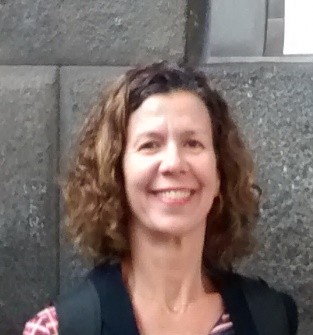
Ricarda Rende
Vice-Chair, ITU-T Study Group 20
Ms. Rende holds a degree in electrical engineering, a master’s degree in Next Generation Networks and a specialist qualification in system telecommunications and IoT Networks.
She has been active in the telecommunication market for more than 30 years, working in various areas including private sector (vendors and telecom companies) and public sector as a specialist at the Brazilian National Telecommunications Agency (Anatel). Her international experience includes working at Nortel/CALA-ETAS in USA as well as participating in international training programs at NTT in Japan and at CEDT/AECID in Spain.
At ITU-T, Ms. Rende serves as vice-chair of SG20, WP3 and SG20RG LATAM. She is also responsible for bringing Brazilian experiences as a developing country. Her main area of interested is related to IoT and Smart Cities, with a particular focus on adapting international standards to the context of developing countries.

Soumaya Ben Dhaou
Research Coordinator, United Nations University (UNU)
Soumaya Ben Dhaou is currently research coordinator at UNU-EGOV, the United Nations University Operating Unit on Policy-driven Electronic Government, a think-tank devoted to multidisciplinary research on how digital transformation may contribute to empowered democratic citizenship, trustworthy public infrastructures, more inclusive societies and, in broad terms, to sustainable development. She is also International consultant for UNDP in Uzbekistan and invited professor of e-governance and ICT for Government and Public service at the University of Minho in Portugal. She coordinates the research project on “Digital transformation strategy” as well as the research line on the “Emerging technologies for digital transformation in the public sector.” Her research includes potential benefits and challenges of new technologies such as Blockchain, Internet of Things, Artificial Intelligence, Data analytics, and their impact on transforming urban centers and settlements into smart cities and communities, and more broadly Government and public service. She also led the “Blockchain4Cities” research project in “United for Smart Sustainable Cities” (U4SSC) joint Global initiative managed by ITU and UNECE. The scope of her research projects encompasses countries, regions, urban and rural areas as well as municipalities, inter-organizational and single organizations.
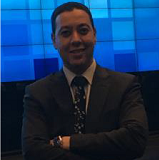
Ramy Ahmed Fathy
Chief Expert, Digital Technologies and Public Policy, NTRA, Egypt
and Vice Chairman, U4SSC
Dr Fathy is a seasoned digital transformation and technology executive, with 20+ years of technology and regulatory experience in ICT, leading large-scale digital initiatives that span digital technology, and policy spaces, leveraging strategic vision and communication skills to influence C-level decision-making while driving innovative risk-based solutions that enhance business capabilities in complex, global organizations. He is a highly experienced leader with strong competencies in corporate governance, technology and product development, risk oversight, financial oversight, cyber-risk oversight, talent oversight, strategy & planning, corporate transformation, and digital transformation.
At NTRA, he has spearheaded teams tackling core regulatory functions including strategy and market development, market analysis, economic analysis, cost-benefit analysis for rule makings, regulatory impact assessment, standardization and technical aspects, international policies, cooperation and partnerships, research & development, and Industry 4.0 planning.
Over the span of his career, Dr Fathy has overseen the development and implementation of large-scale projects with multiple stakeholders in areas like smart cities, smart mobility solutions and intelligent transportation systems, augmented and virtual reality, digital agriculture, smart water management, aerospace, energy metering and distribution, robotics, embedded systems, IoT, 5G, and AI. He has done advisory work on advanced ICT/Digital solutions design and standards-based implementations with an emphasis on security, interoperability, and integration.
Dr Fathy has been serving in several key roles in the ITU including the Council, Plenipotentiary Conferences, TSAG, TDAG, Study and Focus Groups. He is currently the Vice-Chairman of United for Smart Sustainable Cities (U4SSC), and Co-Chairman of ITU-T/FAO Focus Group on Artificial Intelligence & IoT for Digital Agriculture (FG- AI4A). The U4SSC is a global UN initiative coordinated by ITU, UNECE and UN-Habitat, and supported by 16 UN agencies, to exchange information and build partnerships to guide cities and communities in achieving the UN Sustainable Development Goals. He also serves as the Chairman of ITU-T SG20 Regional Group African, whereby he is leading African standardization and smart city development efforts to promote sustainability, interoperability and economic development across the region.
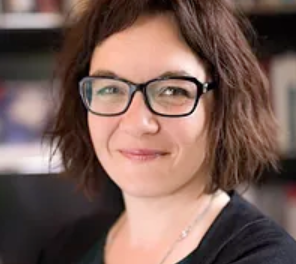
Kamelia Kemileva
Co-Director, Programmes and Administration
Kamelia, holding an MBA, has in-depth experience in executive administration of non-profit organisations. She is a lawyer, specialized in Swiss law relevant to international organisations and international public law, including expertise on the United Nations. Kamelia also has a direct experience of intergovernmental multilateral negotiation and diplomacy.
Before joining the Global Cities Hub, Kamelia was Executive Manager at the Geneva Academy. She also worked as Special Assistant to the President of the UN Human Rights Council for three years. She was a Visiting Programme Director at Wilton Park. Previously to that, she worked at the Permanent Mission of Switzerland to the United Nations Office in Geneva. Before moving to the public sector, Kamelia worked for two years in the private sector in a Geneva-based private bank as a compliance officer. She’s a part-time Senior Consultant in AxLR.ch.
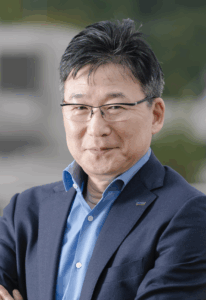
Hyoung Jun Kim
Chair, ITU-T Study Group 20
Dr Hyoung Jun Kim is a Research Fellow at the Electronics and Telecommunications Research Institute (ETRI), where he has served since 1988, including as Senior Vice President leading the Intelligent Convergence Research Laboratory. With 37 years of experience, he has contributed across multiple divisions of ETRI and currently serves as Chair of ITU-T Study Group 20 and the APT Standardization Program (ASTAP). He has held numerous leadership roles in ITU, including Vice-Chair of SG20 and SG13, Working Party Chair, and Rapporteur since 2004.
Dr Kim has submitted over 450 standardization proposals, published 150+ papers, holds 100+ patents, and transferred 20 technologies to industry. His achievements have earned him three Presidential Citations of the Republic of Korea (2003, 2009, 2023) and multiple international recognitions, including ITU-T Certificates of Appreciation.
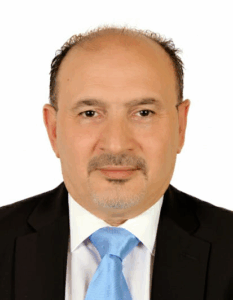
Houssam Al Masri
Senior Project Manager, Khatib & Alami, Saudi Arabia
Dr. Houssam Al Masri is Design Director for Smart City & Mobility at Jeddah Central Development (JCDC), a flagship PIF urban regeneration project in Saudi Arabia. With 30+ years of experience in smart infrastructure, digital transformation, and broadband communications, he focuses on building integrated, inclusive, and human-centered smart city ecosystems across the MENA region and beyond.
He has led major ICT and smart city programs across public and private sectors, including senior roles with Saudi Oger, Alpinada Telematics (UAE), STC, Mobitel Iraq, OGERO Lebanon, and COSMOS Engineers. His work spans FTTH strategy, smart mobility, and nationwide 3G, fiber, and satellite networks serving millions across the Middle East and Africa.
Dr. Al Masri holds a PhD in Electrical Engineering & Computer Science from MIT, an MSc in IT Management (Anglia Ruskin University, UK), and a BSc in Telecommunications Engineering (Beirut Arab University).
He serves as Chairman of the Smart City Optics & Applications Committee at the Fiber Connect Council MENA, Co-Leader of the Digital Public Infrastructure Toolkit under U4SSC, and member of ISO/TC 268, IEEE, ESRI GIS, and the Green Buildings Association.
Recognized as a regional leader in FTTH strategy, digital public infrastructure, and smart mobility, he advocates for scalable, standards-based solutions that enhance urban resilience, sustainability, and inclusion.
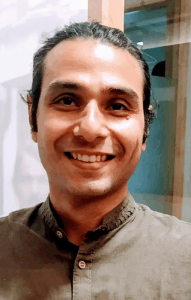
Jojo Mehra
Chief Product Officer, eGov Foundation, India
Jojo Mehra is the Chief Product Officer of eGov Foundation and a digital innovation professional with 25-years of experience in leading product design & development, business model innovation, and digital strategy. He was part of the early team at pioneering digital start-ups like rediff.com and Yoomedia Plc. and also co-founded a shared accommodation platform startup.
Jojo is passionate about the role that digital technologies can play in addressing some of the most urgent challenges facing society. He believes that humanity has entered a new techno-economic paradigm that is changing how we work, how we live and how we engage with each other. Given all this, it’s his firm belief that the coming changes work for the many, not just the few.
Jojo holds a bachelor’s degree in Economics from Loyola College (India), and master’s degrees from the University of Warwick (UK) in Creative and Media Enterprises and TalTech (Estonia) in Technology Governance and Digital Transformation.”
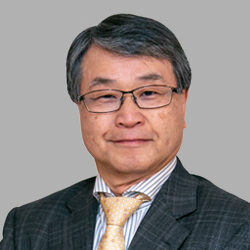
Seizo Onoe
Director, Telecommunication Standardization Bureau, ITU
Seizo Onoe took office as Director of the Telecommunication Standardization Bureau (TSB) at the International Telecommunication Union (ITU) on 1 January 2023. Known in the industry as “the father of LTE” (Long-Term Evolution mobile broadband), he now aims for global outreach to bridge standardization gaps, deliver the benefits of technology widely and speedily, and ensure meaningful and affordable broadband access for everyone. Before his election as TSB Director by ITU Member States, he completed an over 30-year career with Japanese mobile operator NTT DOCOMO. In 2021, he became Executive Vice President and Chief Standardization Strategy Officer for NTT Corporation and a Fellow of NTT DOCOMO. From 2017, he served as NTT DOCOMO’s Chief Technology Architect and President of its subsidiary DOCOMO Technology. From 2012 to 2017, he served as NTT DOCOMO’s Chief Technology Officer and Executive Vice President, a Member of the Board of Directors, and Managing Director of R&D Innovation Division. Earlier, he served as Senior Vice President and Managing Director of NTT DOCOMO’s R&D Strategy Department and Managing Director of the company’s Radio Network Development Department. Mr Onoe holds a Master’s degree in electronics from the Kyoto University Graduate School of Engineering.

Patricio Reyes
Senior Researcher, Data Analytics and Visualisation Group, Barcelona City Council, Spain
Patricio Reyes is a senior researcher in the Data Analytics and Visualisation Group at BSC. He leads the Urban Data Science research line, which focuses on evidence-based solutions for urban planning. The multidisciplinary approach of the research line is reflected in the diversity of the collaborations: visualisation experts, geographers, urban planners, policy makers, developers and researchers.
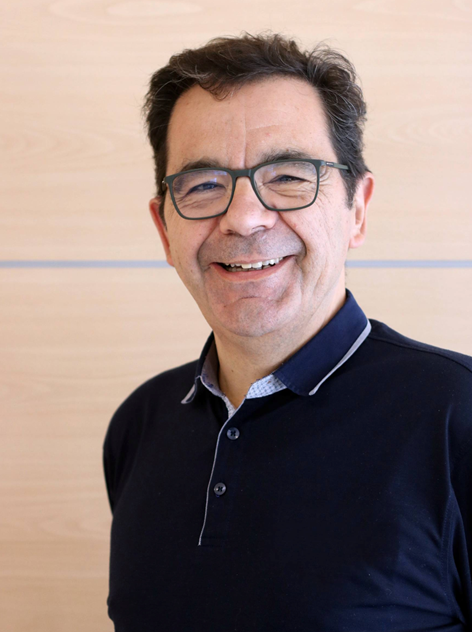
Jordi Ortuño Ribé
Directorate of Innovation and City Technologies, Barcelona City Council, Spain
Jordi Ortuño Ribé is an Innovation Coordinator at Barcelona City Council in Innovation Directorate. With extensive experience in the ICT private sector, he joined the city council 16 years ago and has since been involved in numerous European projects and initiatives, primarily in the Urban Mobility sector, including actively contributing to a winning proposal for EIT Urban Mobility, whose headquarters are hosted by the City.
He currently serves as Deputy Chair of EDIC on Local Digital Twins and as Co-Chair of the Monitoring and Measurement Working Group within the Living-in.EU movement, driving initiatives to advance digital innovation in cities. Most recently, he led the development of a set of cross-sectoral Guidelines for Digital Twins, collaborating with 11 cities under the Eurocities framework to foster best practices and support city-to-city knowledge exchange.
Passionate about digital transformation, he is committed to strengthening the community around digital services to improve citizens’ quality of life, with a focus on improving processes and fostering collaboration.

Tatiana Roque
Deputy Mayor, Rio de Janeiro, Brazil
Tatiana Roque is the Secretary of Science, Technology and Innovation of the City of Rio de Janeiro and an elected member of the Rio de Janeiro City Council. A mathematician and philosopher of science, she has become one of Brazil’s most prominent voices at the intersection of science, democracy, and technology. In her government role, she has led projects such as Rio AI City, which aims to establish one of the world’s largest hubs for artificial intelligence and cloud computing, and aids the expansion of the Rio Operations Center (COR), Latin America’s most advanced real-time urban monitoring facility. She also represents the city in Rio Innovation Week, the region’s largest technology forum, promoting debates on AI, smart cities, sustainability, and digital governance.
Before entering the government, Roque built a distinguished academic career as Professor at the Federal University of Rio de Janeiro (UFRJ), where she directed the Forum of Science and Culture. She is the author of several acclaimed books, including História da Matemática: Uma visão crítica, desfazendo mitos e lendas—winner of the Jabuti Prize in 2013—and O dia em que voltamos de Marte (2021), which explores the political and cultural dimensions of science. She holds a PhD in Production Engineering (History and Philosophy of Science), an MSc in Applied Mathematics, and a BSc in Mathematics, all from UFRJ.
